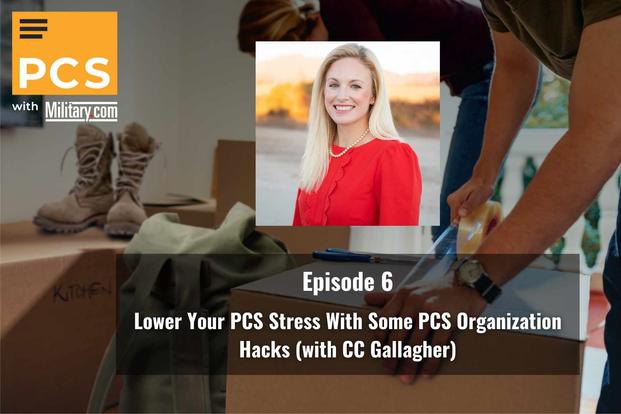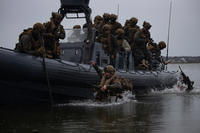Military Permanent Change of Station (PCS) stress can feel like one thing after another piling on until you’re just so exhausted, you crack. One way to lower stress ahead of time is to get organized around your move. That can include leaning into organizational tools or even an Excel spreadsheet.
For CC Gallagher, an Army spouse and military spouse resource expert, that means leveraging a label system for your pack-out. When she couldn’t find one that fit her needs, she created it herself and now sells it through her website. In this episode of PCS with Military.com, CC talks about her favorite PCS organizational tools and her Stressless PCS Kit.
Follow and Subscribe to the PCS with Military.com Podcast
iTunes | Google Podcasts | Spotify | TuneIn
Connect with this episode:
Get military PCS advice in your inbox
Learn more about military PCSing
See more about the Stressless PCS Kit
The following is an edited transcript of this episode of PCS with Military.com.
Lower Your PCS Stress with Some PCS Organization Hacks (with CC Gallagher)
Military Permanent Change of Station (PCS) stress can feel like one thing after another piling on until you’re just so exhausted, you crack. One way to lower stress ahead of time is to get organized around your move. That can include leaning into organizational tools or even an Excel spreadsheet.
For CC Gallagher, an Army spouse and military spouse resource expert, that means leveraging a label system for your pack-out. When she couldn’t find one that fit her needs, she created it herself and now sells it through her website. In this episode of PCS with Military.com, CC talks about her favorite PCS organizational tools and her Stressless PCS Kit.
Follow and Subscribe to the PCS with Military.com Podcast
iTunes | Google Podcasts | Spotify | TuneIn
Connect with this episode:
Get military PCS advice in your inbox
Learn more about military PCSing
See more about the Stressless PCS Kit
The following is an edited transcript of this episode of PCS with Military.com.
Amy Bushatz: Military moves force us to be scrappy, really scrappy. Military spouses and family members are often left dealing with the details of moving a large household and all of the nuts and bolts of family schedules, doctors, school, daycare, whatever, to a new location while the service member reports for duty or is away serving. For single service members or dual service members dealing with their move, the challenges may look more like moving on a tight schedule without any wiggle room afforded by having someone who isn't in uniform at home to deal with the moving details.
One of the best ways to tackle the chaos of military moves is to be super organized about it. Using labels, a binder and home inventory systems or whatever works for you. Today's guests, CC Gallagher found herself looking for a moving kit labeling solution during each of her moves, but couldn't find someone making what she needed. So she made it herself and launched it as a small business called the Stressless PCS Kit.
Now, before we get going, I have to tell you one thing about CC. Talk about scrappy. CC is, to me, the ultimate military spouse chameleon, growing and leveraging her experience and career to meet whatever she finds waiting for her.
And boy, does she do it well. She has managed a variety of military spouse and family focused programs at Defense Department contractors. And when I originally met her, she was advocating for supportive federal policies as the lead of spouse programming at the Military Officers Association of America, or MOAA.
And she's also helped lead government relations at the National Military Family Association. CC knows what she's doing and when she creates a solution, you better believe it works. And that's why I trust her to bring us her best PCS organization tips today for PCS with Military.com. CC, welcome.
CC Gallagher: Oh, well, thank you so much. What a lovely introduction and chameleon is a great term to utilize for what my professional and personal background has been up to today.
Amy Bushatz: Well, and we were chatting before we started recording about that very thing. So it's funny that I was already going to say that when I introduced you.
CC Gallagher: Thank you for having me, Amy. This is such an honor and pleasure to be here with you today.
Amy Bushatz: So talk to us about how many times you've moved with and without the military.
CC Gallagher: That's a great question. So we are in the military, we have moved six times and 13 years, and we are heading into our seventh move this summer of 2022. And prior to that growing up and through undergraduate and graduate school, five times with my family.
Amy Bushatz: So a lot is the answer.
CC Gallagher: A lot! Many times
Amy Bushatz: Coast to coast. And when I mentioned military move chaos, I know you personally experienced this. So what was your most chaotic, stressful move? What happened there?
CC Gallagher: So my that's a great question too. My most chaotic, stressful move, I would say, has to do with locations and where we moved from and where we moved to.
So it wasn't anything crazy. Like our household goods were broken or the truck never showed up. It was more of the situation and location where we are going to, and having that culture shock. So we're stationed at Fort Carson in Colorado Springs. Beautiful mountains, trees, grass, all the lovely things.
And we received orders to Fort Irwin California, six weeks before we were supposed to show up. So first it was a culture, it was just a shock to the system of that move. And then we had to downsize in the home that we, went from, to -- we were moving to a desert, the Mojave desert to a very remote installation, like an island in the desert is what people call it. And it was further from family, where our family is located in Florida. So we are just moving further away. And so, I remember on that specific move, after days of traveling in the car and at the time we had toddlers who drank formula out of bottles and you know, like, oh my gosh, we just, we showed up with dirty clothes in our car and just, we were just a mess.
And the installation issued us one house. There's only one house available, one option. And I remember going into it because I was so shocked about where we were again, growing up in Florida, but moving to the desert. I just remember looking at my husband and saying, do you hate me? Like, why are we moving out here? I just don't understand. I can't wrap my brain around it.
And so, it was stressful from a very personal situational standpoint. I mean, everyone was healthy and safe and we made it and it was good, but I just, it was one of those monumental moments as a spouse where I'm like, man, we really sacrifice a lot, right, in this life.
Amy Bushatz: And isn't it just the sum total of stresses that makes something over the top. It's never just the one thing. It's the short-term orders and chaos in the car and toddlers.
CC Gallagher: Toddlers screaming and crying. And then yes, desert where there's no living things outside of people.
Amy Bushatz: It's all of them piled onto you at the same time. And now what you have is a very stressful move situation, and you're still doing all of the normal move stuff, like figuring out where to take your kids to the doctor and trying to meet new friends, and unpacking your house and placing all of your dry, open, dry goods that were in your cabinet, just on and on.
CC Gallagher: And not only that, because I know you work as well. But also managing working. I've always worked full time through every move and I've really had to fight to stay in the workforce right. Through all these moves. So it's also managing the professional side. Trying to keep composure there. And then in addition to that it's schools and daycares and support when you're moving so much further away from that community that you know. So yes it's like every single time we all go through this stressful period. But come out stronger and more resilient from having lived through it. But during the time it's very hard.
Amy Bushatz: Yeah. And I think it's that pile of stresses that makes it a important thing to remove the ones you can .
CC Gallagher: Correct, take control of that
Amy Bushatz: Take control of the periphery, where you can find it.
So I'm wondering specifically what organizational mistakes, because organizing and keeping your stuff in hand, if you will, is a really big part of just sort of removing those periphery stressors. So what organizationals mistakes have you made over the years and what do you see other people consistently making? Because of course this is a community event.
CC Gallagher: It is, it takes a village on all sides. Even with people you don't know, they become your village. Okay. So organizational mistakes I have made over the years, I've got a few that come to mind.
Not starting early enough to prepare for the move, right? So I get in the mental state where it's so overwhelming to think about, I've got to go through the entire house to purge everything. To me, that's overwhelming. So my recommendation and what I tell other people to do is kind of break your house up by room, and then it doesn't feel so large. So if I go through the master bedroom this week, or the basement or a garage, and just kind of break that up over time. But procrastination is the enemy of getting ready for a move I would say.
Amy Bushatz: I was just thinking Megan Harless, one of our other podcast guests, talks about creating an inventory of her entire house and just that idea really stresses me out.
CC Gallagher: No it's, and that was my next thing is because our houses are all different, no house is the same, the measurements of the rooms are different. And so I have started in addition to Megan's advice of creating that inventory on and an Excel spreadsheet, I also have started to measure our furniture. Okay, so I will measure furniture and place that in my little sheet of notes. And then I'll buy painters tape. So whenever we receive the household goods on the other side, I will literally just outline it based on the measurement, so I know and can see if it will fit in that room.
So many times we have moved into smaller spaces or the rooms aren't adequate enough for a piece of furniture. And you're like, oh, this is, at least I knew before they came in and they were moving our furniture 10 times. So yeah.
Amy Bushatz: Yeah. Yeah. I mean, it's the same concept with getting curtains that fit various windows. Although I don't know what the size of those curtains I have in a pile actually are I just know they aren't the size I have now.
CC Gallagher: Correct. Yes. Oh my gosh. The amount of curtains that we have gone through. Yes. But I would say those are the, my biggest mistakes waiting too long. So now I, I start much earlier and then also I measure the furniture just so when I get to that next space, I can see and, and, just kinda map out what that looks like when the movers come.
Amy Bushatz: Do you also then not keep furniture that you know is not going to fit in the next space, or it doesn't have a home in your home?
CC Gallagher: Oh, gosh, right? Yes. And this is one thing that kills me. I feel like military family spent so much money on furniture or storage supplies or, or whatever that is because the homes are so different. So yeah, we go through that cycle of selling a lot, or purchasing a lot to fit the space. So either way, it's just, you're losing money on both sides.
Amy Bushatz: Yeah. Yeah. In season one, we had an episode with Maria Reed who is a Army wife who I'm sure you know, but she does military home make-overs in and organization around decorating and her specific recommendation -- in fact it was so important to me that I put it in the title of the episode, do not buy a sectional couch because it is not going to fit in the place you're going probably.
CC Gallagher: I love that advice because what happened to us from Colorado Springs to Fort Irwin, is that we had to sell it. And I'm like, oh my gosh, we spent, however much money to buy this sectional couch for this room. And then we had to get rid of it. You know, it's interesting on this move coming up, we're going from Fort bliss, Texas, where we are now, to Carlisle Barracks in Pennsylvania and the homes there they are small, like a lot smaller than the home on the installation that we live in now at Fort Bliss. And so we're considering getting a pod and storing half of our furniture for a year. I don't know, just sucking up the cost because again, you're losing money on every way that you go. So we're exploring ideas about that now. So yeah.
Amy Bushatz: As someone who's really into PCS organizational tools, you have, I mean, you have your own small business around it. Okay. So I know you have favorites, but I want to talk about what or other organizational tools you like, but first tell us about the Stressless PCS Kit.
CC Gallagher: Absolutely.
So the Stressless PCS Kit in its most simplistic form is an all-in-one labeling system to really help create that organized move. And so, what the kit contains, so I'll tangibly talk about what that is that there are 240 color coded labels with unique icons on the kit labels. There's eight different room categories. So when you look in your home, you have your bedrooms, your living rooms, your bathrooms, kitchen, dining, storage. I have one in there for pro gear. Because as you know, our service members have pro gear, but spouses who work? They also have pro gear as well. And then there's a blank label set for any additional rooms that you may have. I know people have used it for pets or they've toy rooms or whatever additional, rooms that they have.
In addition to those labels, we've got 12 door hangers and this was important to me to create, because I remember as I was starting this concept, I would tape a piece of computer paper on a door and say, like master bedroom or boy's bedroom. And so I was like, wouldn't it be great if I didn't have to carry tape and just hang something on a door.
So, door, hangers, go with it. And you place your color coded labels on there. And then you instruct everyone where to go to. And then in addition to that, there is an instruction sheet. So it kind of walks you through the entire process of how to utilize the kit. There's also a room chart that allows you to record the number of boxes per room, or, you know, what the proposed floor level is that you want those boxes to go to.
And then I just have a personal greeting in there with with a personal family recipe. I know this sounds so odd, but one of the best things when you get in your home is to cook something that's meaningful that tastes like home. You've been on the road or in airplanes, wherever you are for so many days, and so I have a personal family, favorite recipe in there for you to share with your family as you get settled in. So that's tangibly what's in the kit when you receive it at your house.
Amy Bushatz: And what were you responding to? You mentioned the door hangers, responding to need that where you don't want put computer paper up, but what other problems of your own were you responding to for making this? Cause if I remember correctly you made this for yourself and then.
CC Gallagher: I did. Oh my goodness. I yes, for me and really what inspired to create it is just downsizing and houses from that Colorado to Fort Irwin move. And, oh gosh, I had spent so much money on oh, God, I like all the different colored duct tape rolls, the labels, the shapes and sizes, packages of ink for my printer to print everything in, Sharpie markers.
I mean, you name it. You could go to Office Depot and spend a million dollars just on moving supplies. Ziploc bags, everything. But none of them were created the solution that this kit provided me. So yeah. So I was like, that's it. I'm going to hire a graphic designer. We're going to test this kit out. I'm going to spend some money because I know that it will just make me happy inside to feel a little bit more in control of our move. And so I did that and um, what was funny is as I received the proof kit of what it is now and one of the earlier iterations of it, a neighbor of mine, they were PCSing to South Korea. So at this time we were leaving from Irwin to come here to Fort Bliss. And she's like, hey can you print me off a kit? Like, I love this idea. We have long-term storage, we have OCONUS moving their move looked very different from ours. And that was also part of the process of creating this was to make sure that we're taking care of our families who are moving overseas.
And so I printed her off a kit and then it just kinda caught on with other friends in the neighborhood. And then and I was like, okay, maybe I can help other military families with their move by providing this. And I would say the interaction with this product was very positive. I think right now we've sold over 500 kits to families they're around the globe.
I am able to ship kits. I think this week it was like to Alaska and Virginia one to Japan. I mean, it's very overwhelming we welcome in different areas and where spouses find out about it, I love the personal notes that I get. There that's our family, right? Like everyone is so similar and kind of going through this difficult, tragic, not tragic, but difficult, traumatic experience of
Amy Bushatz: Maybe tragic.
CC Gallagher: Maybe tragic. In some cases, sometimes they feel tragic.
Amy Bushatz: What are some of your other organizational tools that you like other than the kit that you created for yourself? You mentioned an Excel spreadsheet earlier. I know it's keep it simple stupid, but I'm not going to call an Excel spreadsheet my favorite tool.
CC Gallagher: It's a tool. It's not a favorite tool. I just purchased for this move. There's another military spouse owned company called List and File. But it's a binder specifically for moving that organizes all the kid stuff for us, like our kids' documents like our household good documents.
And so I was like, I would love to give this a try and I've already started to use it to prepare, so I, I I'm hopeful that will be great. But one tool that I would love to share with you, it's not necessarily a PCS related, but it is like sanity saving for me. So there are these health and wellness coaches at Military OneSource, I don't know if you've ever heard of this, but I share this resource with so many spouses, because it has helped me with every PCS move, every new child in our house who joined our family or whatever that looks like. But it's just to make sure that I'm integrating self-care into this entire process and kind of leading up to a move, but then also starting that new process of self care after we arrived somewhere, because you're still trying to discover where is the gym, can I exercise or how do I eat better after eating fast food for how many days? And so it's important to take care of you too. And I just want to throw that out to spouses out there. Yeah.
Amy Bushatz: And that's different then nonmedical counseling. That's a different program.
CC Gallagher: Different, different program. But vitally important in other ways, right? Like we need, we someone who can hold you accountable and provide recommendations on you know how to make sure we're concentrating on your health and wellness, so.
Amy Bushatz: Absolutely. And the reason I mentioned it's different than the nonmedical counseling because there's some rules around the nonmedical counseling in terms of sessions per issue and that kind of thing, but the life and health and wellness coach is a different program.
And it is also very valuable. In fact, as you're talking, I remember Jacey Eckhart who some of our listeners may know as a veteran transition coach right now with Military.com, but has had a long career in military spouse stuff as well, told me once that she actually used one of the life coaches within the Military OneSource program and was just bowled over by how valuable it was and then found out what the cost of that would be if she used that outside of the military spouse program. It's just like, why is no one else using this resource? And the funny thing is as you're talking, it had never even occurred to me to call one of these coaches on, in the subject of PCS.
CC Gallagher: Moving yeah, no and I, I, that's why I'm sharing it , because it's so valuable. But yes, I've worked with the same health and wellness coach, I think six times, like every single move that we've made and we have two young kids and, you know, going back to maternity leave and PCSing. And so it's just a great, Military OneSource is incredible in and of itself, but I love love, and advocate for health and wellness coach, right. Anything to fill our cup up because we are always putting ourselves last. So, do your best to put yourself first.
Amy Bushatz: Yeah. The other thing about it is when I ask about resources, I'm thinking about apps specifically or something along those lines, but what you're suggesting is a resource is asking a human for help.
That should not be mind blowing, but every time I have stopped to think, okay, maybe I don't, I know this is crazy, maybe I don't know everything and I should just reach out and see if there's something I haven't thought of in whatever realm it is. I never regret doing that. And the resources are there for us, whether it be through Military OneSource life coach, or I reached out to a career and education advisor with the USO, and bowled over by it. She suggested some programs that I didn't end up using, but I certainly keeping in my back pocket in terms of continuing education that I knew about, but I didn't know applied to me for some reason. It was, yeah, it was a great reminder that no matter how immersed you are in this life, you are always going to not think of everything.
CC Gallagher: Correct. And you're always going to rely on other people to give you their best. I love this question, right? Like, it's just so good because we all come from different frames of reference and have like our own tools that we utilize. So that's a great question.
Amy Bushatz: Yeah, absolutely. Is there anything else that you know, we've talked about specific to military moves and you mentioned Military OneSource, is there any other tools that you use that are not maybe even created for moving or hacks that you really enjoy.
CC Gallagher: Um, as far as created for moving.
Amy Bushatz: Or not created for moving, just sort of in the world. I hate to go back to Excel that's the beast we can't get away from.
CC Gallagher: I know Excel spreadsheets are great. The photo app, like the camera on your phone, taking pictures of everything, everything before you move, let me preface with that. I know sometimes we get the stuff after we move and we're taking pictures of maybe with the damages or what that looks like. But along with that inventory, it's best to take pictures or even like a video of a room, because once your stuff goes in that sea of brown boxes, you it's like, everything comes out of your mind.
You have no idea what is in there because it doesn't look obviously the same as when it came out of your house. So I do like videos, I'll take snapshots. And then I have the inventory in the Excel spreadsheet. But, you know what I, I think that's, those are kind of, my standards.
Amy Bushatz: No reinventing the wheel, you mentioned the sea of brown boxes. I always have this feeling while my house is being packed or just sheer panic, no matter what, no matter how organized I am. I sit there and I don't know what to do with my hands. I feel like I should be watching everyone at the same time. I feel like I should be monitoring five packers at the same moment to make sure my shoes aren't on top of my wedding dress or when the stuff comes off the truck, I should be checking off boxes, but also inside making sure that they're going in the right spot.
And the truth is you can't be everywhere at once. And it's all very overwhelming.
CC Gallagher: Yes. And you know, what's interesting about, I love that you said that it's like, you're an air traffic controller, but like in your home. With all these moving parts and pieces a spouse, several spouses have asked me, like, how do you use this kit when there are four or five people packing your house out?
Like how are you supposed to be in five places at once? And so what I told her, I said, what I asked the people to do is start in one area of the home. So even if you're, even if you have like a big garage, right, and they need to pack all the garage items I asked them all to start there. And so I'll take notes I, and I kinda just hang with them because they know that I'm invested in making sure that they do the best job, but I'm also there to support them.
So that, that's my advice, especially if you're considering using the kit. It's just work and communicate with those packers. They are your friends that day, right? They are, they are there to do a job, but you need them on your side. I always feel that way, to build a relationship they're touching your most precious items. And I don't know. And then just help guide them, give them instruction and set the pace. Right. Set the pace and set the standard of how you want them to label your boxes and just say, I'm going to utilize these labels. And in addition to all the great work that you're doing, I'm just, you know, it's a force multiplier for our family.
Amy Bushatz: Right, because it's easy to come into that stressful situation with an attitude of defensiveness.
CC Gallagher: Oh, always. Yeah. I hear you.
Amy Bushatz: And it's because there's so much to be defensive about that. I mean, it's logical response, right? Especially when you hear of all of the trouble that people have had and all these stories about loss and breakage and that kind of thing, but the truth of the matter is that it's probably better to assume that everyone is doing their best in that moment instead of defaulting to the other assumption, which is we're all out to get everybody cause that's the, that's the opposite. And, enter into this with best foot forward, as a partnership and not to minimize what someone else is doing and was hired to do and is there to do, but come alongside and be like your system's good. I have a system it's not replacing yours. It's in concert with.
CC Gallagher: That's right. I am enhancing what's going to help me feel in control and just kind of more organized on the backend of receiving your household goods. But yeah, partnership and just create a good, like a good welcoming environment, so.
Amy Bushatz: Yeah, and the other thing I think that people forget is that the people who are loading your stuff, the agents are not, who's going to be on the other end. And so that's the last time they're going to see these things. And while the system might make sense to them in the room, it's not going to make sense to somebody four months down the road who's never met them or heard about their system.
CC Gallagher: Correct. And it's, that is such a good point. So it's imperative on the front end. And then when you receive your household goods, typically what I do is, I will walk the whole team, so the packers, the unpack you know, the people who are going to unpack your items, I walk them through the house and I will tell them about the different colors, color coded what a room names are, and it was really fascinating when we PCSed here to Fort Bliss, and the system was actually working in process. I literally stood on the front step of our house. And they'd come off the truck with a dolly and you'd be able to see these large color coded labels on the brown box, sea of round boxes that look like Tetris coming off of these massive trucks.
And, and it would took me maybe like twice of walking through the house and showing them, and then it was automatic. So like all those moments where I was chasing my young kids who are not in daycare yet or school, I felt confident that these movers, they knew they had the process. They had a game plan down and it, I tell you what, coming into the home, it took way less time. Right. They could actually set a bed up before it got dark outside. And I wasn't freaking out about the crib or, you know, whatever that was. So, it just, it's so efficient. I just hope that people use it or some sort of system that helps them.
Amy Bushatz: Because again, that setting up of the crib or that's setting up the bed before it gets dark. That's the example of the last straw we were talking about earlier.
CC Gallagher: The last straw. Yes.
Amy Bushatz: Piling on. Everything was fine until the toddler could not go to bed because the bed was still in pieces.
CC Gallagher: Not made. And I don't know how to put the toddler bed together. And the pack and play is at the, I don't know the hotel who knows pack and play could have fallen out of the trunk on the way.
Amy Bushatz: Yeah. So exactly. It's the last, it's the last straw and it's example of those incremental stresses that we are trying so desperately to avoid.
CC Gallagher: So true.
Amy Bushatz: Do you have three or four specific tips for people who are trying to stay organized around a PCS? We've talked about a couple of things in passing, but maybe you can just sort of tie up everything in a bow for us, just practical steps, like, Hey, you're thinking about this. You're in the thick of it. Here's what to do. Here's what to think about.
CC Gallagher: I would say I've got four keywords I utilize my thoughts prior to a move, which are toss, donate, sell or keep. And I literally live by those, those words, especially as I'm prepping to leave. Because so often we'll say, oh, I'll get it on the back end of the move, or I don't want to approach this room yet, but those four words will change your life. Toss, donate, sell or keep. I would also say Amazon Prime has been a good friend of ours because I will send items ahead of time, even if it's to a hotel or to like a friend's house. If we have someone on the other side.
So, Amazon prime items that you are just like, I don't have room to pack or I don't know, they get thrown out along the way. And even sending a box at a time, whether it's Amazon or not, maybe it's like necessary clothes or jackets or things that you just don't think about or don't have room to pack with you.
Someone would, I'm sure someone would be happy to receive a box for your family as you make your way across the globe to kind of get you that jumpstart when you go there. And then the, really, the last thing I would say is try to make a vacation or a fun experience out of it. Right? Like we often lose our patience and we often lose our sanity I feel like as we're going through this. So if there's a way that you could integrate a fun event for the family, an experience, just do your best and take the extra step to try to do that and really appreciate that family time as much as you can.
Amy Bushatz: Not to go back to the boxes, out of the box thinking if you will. You know, it never even occurred to me what you just said to, to mail stuff ahead of time. I think about putting things in the car that we'll need when we get there, not sending it in advance, but why wouldn't I do that? Man I would've saved myself a lot of cold days in between when we packed up in Tennessee and arrived or had our stuff, arrive rather in Alaska by shipping ahead a box of sweat, just even sweatshirts and long pants for the climate here in June, which was not at all the climate, not at all the climate where we had come from, or even driven through on the way here. And instead I get here and I have non adequate clothing.
CC Gallagher: Clothing. Yeah. It's so true. Oh my goodness. It's so true. Yeah, we typically I'll try to send stuff. I'll Amazon it, or I'll pack a box and tell our kids to pick, like, we take stuffed animals with us. We're just in that phase of life, of young kids. But if there's something that they want to open up, maybe there's a toy or maybe there's jackets or sweats or whatever that is to acclimate to the weather an umbrella who knows, stuff that I don't have room for it in the car with everything else that's coming with us.
Amy Bushatz: And if you're driving across country who wants to be taking that in and out of the car to find the thing you do need. Yeah. Because there just isn't room to have stuff packed and an order of need. And inevitably, if you do that, something's going to get put in the wrong spot anyway.
But the thing I want to come back to you on that is this idea that, of what we've been talking about the whole time, where you have the stress pile up. Because in my experience, when you have that stress piling up, what you don't have is the opportunity to think of things like what you're talking about. When you remove the stress of one thing or another, whether that's through keeping a great inventory or through labeling your stuff. Now you have the mental space to think about, oh, maybe I should send some stuff ahead of time.
Oh, hey remember Military OneSource? They have life coaches. Maybe I should talk to one of those. It's just like, you just only have so much brain power for dealing with stressful things.
CC Gallagher: Correct. And that is why procrastination is not your friend when you move. That is exactly why, because you want the space and you want to be able to breathe into something that is going to be extremely hard for everyone in the family.
It's hard but exciting, right? It's an adventure. And that's what we always try to, you know, to phrase it as with our kids and with us, but not procrastinating will give you that open space and that freedom in your mind to be like, oh, I need to pack this in the car, or this is our first night bag or, oh, let me bring some laundry pods and dryer sheets in case there's a laundry machine at a facility we stay at and give yourself, give yourself that space.
The other thing, as I'm thinking about other tools, I'm a, list-maker like list-maker to the t. And so, I will write out packing list for each of the cars again, like what needs to go ahead. And so don't be scared to write something down, cause that also frees up space in your mind too.
Amy Bushatz: Absolutely well CC these are fantastic tips. I really appreciate you giving them to us. Where can people find your Stressless PCS Kit?
CC Gallagher: Yeah. Oh, thank you so much for having me. They can find it at our website, www.Stresslesspcskit.com. We're also on Facebook and Instagram if you want to see some fun photos of labels and packing and notes and all the wonderful things that is involved in our military community and moving so.
Amy Bushatz: Awesome. Well, we'll have those links in the show notes as well. And again, CC thank you so much for joining us.
CC Gallagher: Yay. Thanks Amy. For having me best of luck to everyone, this upcoming PCS season.














